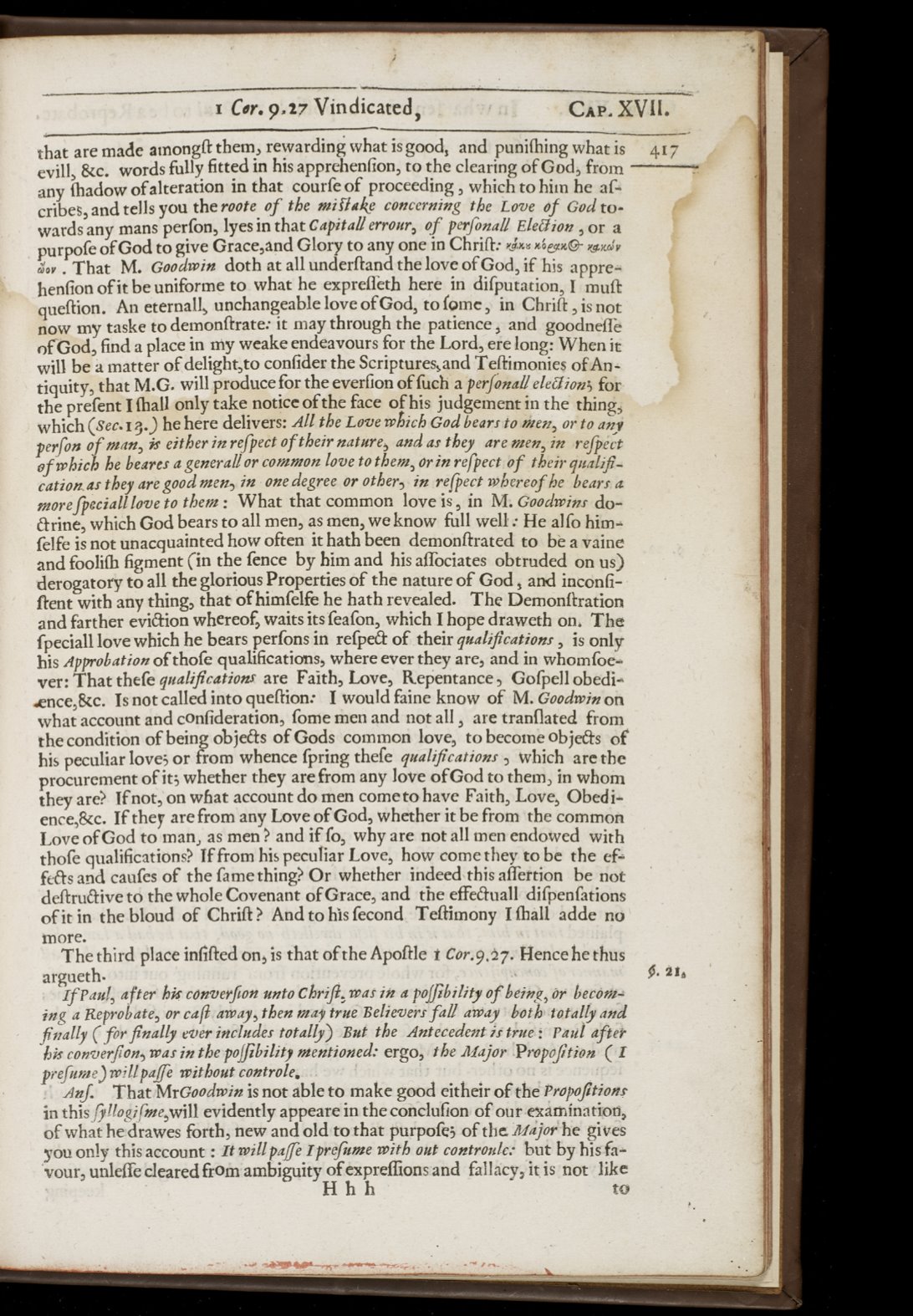

I
Car.
9.27
Vindicated,
CAP.
XVII.
that
are made amongft
them, rewarding
what
is
good, and
punifhing
what
is
457
evill, &c. words
fully
fitted
in
his
apprehenfion,
to the
clearing
of
God, from
any fhadow
ofalteration
in
that
courle
of
proceeding
,
which
to
him he
of
tribes,
and
tells you
the
roote
of
the
mi.11ake
concerning the Love
of
God
to-
wards
any mans
perfon,
lyes in
that
Capitall errour,
of
perfonall Eleílion
,
or
a
purpofe
ofGod to
give
Grace,and Glory
to
any
one
in
Chrift:
4,,k,x6eyesteao
wcds,
goy
.
That
M.
Goodwin
doth
at all underftand the love
of
God,
if
his
appre-
henfion
of
it
beuniforme
to
what he
expreffeth here
in
difputation,
I
muff
queftion.
An
eternal], unchangeable love
of
God,
to tome,
in Chrift
,
is
not
now my taske to demonftrate: it may through
the patience,
and
goodneffe
ofGod,
find
a
place in
my weakeendeavours
for
the Lord,
ere long:
When
it
will
be
a
matter
of
delight,to
confider
the Scriptures,and
Teftimonies
of
An-
tiquity,
that
M.G.
will
produce for the
everfion
of
fuck a
per";
nail
elethon;
for
the prefent I
fhall
only
take
notice
of
the
face
of
his
judgement
in
the
thing,
which (sec.
13.)
he
here
delivers: All the
Love which God bears tomen, or to anti
perfon
of
man,
is
either
in
refpect
of
theirnature,
and
as they
are
men,
in
refpéet
of
which
he
bearer a generall or
common love to
them,
or
in
refpect
of
their
qualifi-
cationas
they
are
good
men, in
one
degree or other,
in
refpect
whereof
he
bears
a
more
fpecialllove
to
them
:
What that
common love
is
,
in M. Goodwin
do-
arine,
which
God
bears
to
all
men,
as
men, we know full well
:
He
al fo
him-
felfe
is
not
unacquainted how often
it
hath
been
demonftrated
to
be
a
vaine
and
foolifh
figment
(in
the
fence
by
him
and
his affociates
obtruded
on
us)
derogatory
to
all the gloriousProperties
of
the
nature
of
God
,
and inconfi-
ftent with any
thing,
that of
himfelfe
he
hath
revealed.
The Demonftration
and farther
evi&ion
whereof, waits its feafon, which
I
hope draweth on
The
fpeciall
love
which
he bears perlons
in refpe&
of
their
qualifications,
is
only
his
Approbation
of
thofe qualifications, where ever they are, and
in
whomfoe-
ver:
That
thefe
qualifications
are Faith,
Love,
Repentance,
Gofpell
obedi-
ence,
&c.
Is
not
called
into
queftion:
I
would
faine
know
of
M.
Goodwin
on
what account
and confideration, fomemen and
not
all,
are tranflated from
the
condition
of
being
obje&s
of
Gods common love,
to
become
obje&s
of
his
peculiar love;
or
from whence fpring thefe
qualifications
,
which
are
the
procurement
of
it;
whether they are
from any love
ofGod
to them,
in
whom
they
are?
If
not,
on what account do men come
to
have Faith, Love,
Obedi-
ence,&c.
If
they arefrom
any
Love
of
God, whether it be from the common
Love
of
God
to
man,
as
men? and
if
fo,
why
are not
all men
endowed with
thofe
qualifications?
If
from
his
peculiar Love, how come they
to
be
the
ef=
fe
&s
and
caufes
of
the
fame thing?
Or
whether
indeedthis
affertion
be not
deftru
&ive
to the
whole
Covenant
of
Grace, and
the
effe&uall
difpenfations
of
it
in
the blond
of
Chrift?
And
to
his
fecond Teffimony
I
(hall
adde no
more.
The third
place infifted
on,
is
that of
the
Apoftle
i
Cor.9,27.
Hencehe thus
argueth.
4.
21,
If
Paul,
after
his converfion unto
Chrifl,
was
in
a
po
bility
of
being, or
bum-,
ing
a iieprobate, or
call
away,
then
may
true
Believers
fall
away both totally
and
finally
(
for
finally
ever includes
totally)
But
the Antecedent is true
:
Paul
after
his converfion,
was
in the
poffibility
mentioned:
ergo,
the Major
Propafitian
(
I
prefume) will
pale
without
controle.
Anf.
That
MrGoodwin
is
not
able
to
make good eitheir
of
the
Propofitions
in
this
fyllogifine,will
evidently appeare in the
conclufion
of
our examination,
of
what
he:drawes
forth, new andold
to that
purpofe;
of
the
Major' he gives
you only this account
:
It
will
pale
I
prefume
with
out controule:
but
by his fa-
'your,
unlefl'e
cleared from ambiguity
of
exprefhons and fallacy, it
is
not like
Hhh
to










